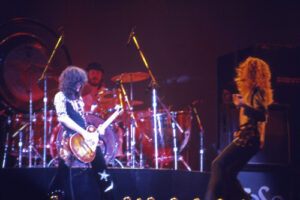
Feature Photo: Debby Wong-Shutterstock.com
This article delves into ten exceptional songs where “make” takes center stage, whether as a force of creation, a plea for love, or an expression of longing. Each track invites us into its world, blending lyrical depth with musical mastery. From soul-stirring ballads to genre-defying experiments, these songs remind us of music’s ability to “make” something unforgettable out of the ordinary.
Sheryl Crow’s “If It Makes You Happy” captures the bittersweet contradiction of finding solace amidst chaos, delivering her raw yet melodic signature sound. “Make It” by Aerosmith bursts with the urgency of ambition, blending gritty vocals with their signature hard rock energy. Bread’s “Make It with You” sweetly serenades listeners with its soft-rock warmth and a heartfelt declaration of love. Chicago’s “Make Me Smile” transcends mere optimism, weaving intricate arrangements with a euphoric refrain. The Stylistics’ “Break Up to Make Up” drapes heartache in a lush, velvety arrangement, evoking a cyclical tale of love and reconciliation.
Aretha Franklin’s “(You Make Me Feel Like a) Natural Woman” stands as a soulful anthem to love’s transformative power, carried by her incomparable voice. “You Make It All Worthwhile” by The Kinks presents a witty narrative, merging domesticity with enduring affection in their theatrical style. The Rolling Stones’ “You Can Make It If You Try” blends bluesy swagger with a lyrical promise of perseverance. Foghat’s “I Just Want to Make Love to You” ignites a sultry, blues-rock fire with its unapologetically direct message of passion. Closing the list, Led Zeppelin’s “D’yer Mak’er” lightens the mood with reggae-infused playfulness, balancing longing with rhythmic innovation.
# 10 – Make It – Aerosmith
A fiery declaration of ambition and resilience, “Make It” serves as the electrifying opener to Aerosmith’s self-titled debut album, Aerosmith, released on January 5, 1973. Recorded at Intermedia Studios in Boston, Massachusetts, in 1972, the track showcases the burgeoning talents of a band destined to become rock legends. Produced by Adrian Barber, the album features Steven Tyler on vocals and harmonica, Joe Perry on guitar, Brad Whitford on rhythm guitar, Tom Hamilton on bass, and Joey Kramer on drums, all combining to create a raw, blues-inspired sound.
The lyrics of “Make It” encapsulate the youthful determination of a band hungry for success, with Tyler delivering lines that inspire perseverance and grit. The chorus, “Make it, don’t break it,” becomes an anthem for anyone pursuing their dreams, urging resilience even when the world feels overwhelming. The line, “History repeats itself, what you just done, so has somebody else,” reminds listeners of the universality of struggle and the need to carve their own path. The lyrical emphasis on “paying your dues” underscores the inevitability of hard work in achieving lasting success, a sentiment deeply resonant with Aerosmith’s rise from local clubs to international stardom.
Read More: Joe Perry of Aerosmith Interview: 13 Albums That Changed My Life
# 9 – You Can Make It If You Try – The Rolling Stones
The Rolling Stones delivered a sharp and infectious take on “You Can Make It If You Try” as part of their self-titled debut album, The Rolling Stones, released on April 16, 1964. The song, originally written by Ted Jarrett and previously performed by Gene Allison in 1957, was recorded during the band’s October 1963 sessions at Regent Sound Studios in London. The album was produced by Andrew Loog Oldham, whose raw and minimalist production style allowed the group’s energy and blues roots to shine. Featuring Mick Jagger on lead vocals, Keith Richards on guitar, Brian Jones on harmonica and rhythm guitar, Bill Wyman on bass, and Charlie Watts on drums, the track exemplifies the Stones’ knack for infusing their blues influences with youthful swagger.
Lyrically, “You Can Make It If You Try” delivers a message of perseverance and effort, a sentiment that ties seamlessly into the theme of this list. The repeated line “You can make it if you try” emphasizes resilience and self-determination, urging listeners to push through challenges. The lyric, “Just a little harder, oh yeah, try a little harder,” captures the song’s underlying plea for grit and commitment. These themes align closely with Aerosmith’s “Make It,” another entry on this list, as both tracks echo the belief that success comes through perseverance and effort, albeit delivered in distinct musical styles. While Aerosmith channels hard rock energy, the Stones ground their approach in raw rhythm and blues.
Musically, the Stones’ rendition of “You Can Make It If You Try” transforms the original’s soulful groove into a punchy, rhythm-driven performance. Charlie Watts’ tight drumming and Keith Richards’ crisp guitar work anchor the song, while Jagger’s commanding vocals infuse it with urgency and charisma. Critics have lauded the track as a testament to the Stones’ ability to reinterpret and revitalize blues and R&B classics, showcasing their early mastery of the genre. The band’s rendition stays true to the song’s roots while imbuing it with their signature edge, solidifying its place as a standout on their debut album.
In the context of this article, “You Can Make It If You Try” complements other songs that explore themes of determination, including the aforementioned “Make It” by Aerosmith. Both tracks underscore the necessity of hard work and perseverance, though the Rolling Stones’ raw, blues-inflected take adds a timeless and gritty flavor to the list. The song’s message of striving aligns seamlessly with the theme, reminding listeners of the enduring power of effort and resilience.
Read More: Complete List Of Rolling Stones Songs From A to Z
# 8 – You Make It All Worthwhile – The Kinks
“You Make It All Worthwhile,” a track from Soap Opera, The Kinks’ 1975 concept album, is a whimsical and theatrical exploration of domestic life and its redemptive power in the face of mundane work. Written by Ray Davies, the song was recorded between October 1974 and March 1975 at Konk Studios in London, with Ray Davies producing. The album marks a notable period in The Kinks’ career, showcasing their pivot toward rock theater, and the track reflects Davies’ flair for storytelling through music.
The song centers on a weary protagonist returning home after a soul-crushing day at the office, only to find solace and humor in the arms of his partner. The lyrics poignantly capture this juxtaposition of drudgery and relief, with lines like, “But when I get home you make it all worthwhile / You make me laugh and you make me smile.” These words encapsulate the restorative power of love and companionship, themes that resonate deeply in the context of this list. The mundane yet relatable exchange over shepherd’s pie humorously underscores the interplay between frustration and affection, with Davies penning, “What’s the point of cracking up all because of shepherd’s pie?” This lyric, like the rest of the song, infuses wit into a commentary on the pressures of working-class life.
Musically, “You Make It All Worthwhile” features a blend of rock, vaudeville, and Davies’ signature narrative vocal style. The interplay of instruments, including Mick Avory’s drums, John Dalton’s bass, and Dave Davies’ understated guitar, creates a theatrical backdrop that mirrors the song’s dramatic domestic scenes. Ray Davies’ vocal delivery shifts from weariness to light-hearted warmth, embodying the emotional arc of the protagonist. Critics have often praised Soap Opera for its conceptual ambition, though it received mixed reviews upon release. Over time, the album has been reassessed as an intriguing entry in The Kinks’ eclectic discography, with “You Make It All Worthwhile” standing out for its vivid storytelling.
In the broader context of this list, the song’s exploration of perseverance and joy in the face of adversity aligns with themes found in “You Can Make It If You Try” by The Rolling Stones. Both songs highlight determination, though where The Stones emphasize effort, The Kinks focus on the restorative nature of personal connections. The humor and theatricality of “You Make It All Worthwhile” bring a unique flavor to the list, serving as a reminder that even the smallest joys can offset life’s struggles, making the daily grind more bearable.
Read More: Dave Davies of The Kinks: The ClassicRockHistory.com Interview
# 7 – I Just Want to Make Love to You – Foghat
Foghat’s electrifying rendition of “I Just Want to Make Love to You” from their 1972 debut album, Foghat, transformed the Willie Dixon-penned blues classic into a hard-rock anthem. Recorded at Rockfield Studios in Monmouth, Wales, under the production of Dave Edmunds, the track showcases the band’s ability to marry blues roots with the driving energy of 1970s rock. Foghat’s interpretation epitomizes their signature sound, blending raw vocal delivery, powerful guitar riffs, and a tight rhythm section to create a track that remains a fan favorite.
Lyrically, the song’s sensuality and directness align with the sultry blues tradition, while Foghat’s amplified approach injects a fresh intensity. The line, “I don’t want you to bake my bread, I don’t want you to make my bed,” captures the narrator’s dismissal of traditional expectations, emphasizing a pure and unfiltered desire. This sentiment echoes through the repeated declaration, “I just want to make love to you,” where the emphasis on physical connection contrasts with societal norms of the time. By focusing on this lyrical rawness, Foghat amplifies the song’s uninhibited passion, making it a unique fit for this list.
Musically, the track is a showcase for “Lonesome” Dave Peverett’s gritty vocals and Rod Price’s searing slide guitar work, which injects a sense of urgency and energy. Tony Stevens’ bass lines and Roger Earl’s drumming anchor the song with a steady yet dynamic groove, ensuring that the intensity never wavers. The production by Dave Edmunds highlights each element, with a clarity that captures the live energy for which the band was renowned. Critics often credit this track as a defining moment in Foghat’s career, cementing their reputation as blues-rock innovators.
When compared to other entries on this list, “I Just Want to Make Love to You” stands out for its unapologetic rawness and bold delivery. Unlike the domestic charm of The Kinks’ “You Make It All Worthwhile” or the motivational undertones of The Rolling Stones’ “You Can Make It If You Try,” Foghat’s track is a visceral celebration of desire. This contrast adds depth to the list, underscoring the versatility of songs with “make” in the title and the varying emotions they evoke. In blending their blues heritage with rock power, Foghat made this classic their own, ensuring its enduring legacy in both their discography and the broader rock canon.
Read More: Roger Earl of Foghat: The ClassicRockHistory.com Interview
# 6 – If It Makes You Happy – Sheryl Crow
Sheryl Crow’s “If It Makes You Happy,” from her 1996 album Sheryl Crow, is a masterful exploration of self-acceptance and the complexities of happiness. Recorded at Kingsway Studio in New Orleans and Sunset Sound Factory in Los Angeles, the track was produced by Crow herself alongside Bill Bottrell, known for his textured and organic production style. The song features Crow on vocals and bass, Bottrell on guitar, and Gregg Williams on drums, capturing a raw and emotionally resonant sound. Upon its release, “If It Makes You Happy” achieved widespread acclaim, earning a Grammy Award for Best Female Rock Vocal Performance and reaching number 10 on the Billboard Hot 100, solidifying Crow’s reputation as a defining voice of 1990s rock.
The lyrics of “If It Makes You Happy” dive deep into the paradoxical pursuit of contentment. Lines such as “If it makes you happy, it can’t be that bad” highlight the song’s central irony, as the narrator questions societal expectations of fulfillment. This is further underscored by the line, “If it makes you happy, then why the hell are you so sad,” which encapsulates the struggle between external validation and inner discontent. The vivid imagery in “I’ve been a long way from here, put on a poncho, played for mosquitoes, and drank ’til I was thirsty again” paints a picture of a life filled with experiences that are both adventurous and isolating, emphasizing the contradictions of Crow’s introspection.
Musically, the song’s blend of gritty guitar riffs and Crow’s emotive vocal delivery creates a powerful and relatable anthem. The dynamic arrangement mirrors the emotional shifts in the lyrics, moving between a reflective verse and an impassioned chorus. When compared to other songs on this list, such as Foghat’s “I Just Want to Make Love to You,” which focuses on raw physical desire, “If It Makes You Happy” takes a more introspective approach, delving into the emotional complexities of finding joy. Similarly, The Kinks’ “You Make It All Worthwhile” highlights gratitude for personal connection, whereas Crow’s track wrestles with the individual’s role in their own happiness.
Critically, “If It Makes You Happy” was praised for its authenticity and relatability. Its enduring appeal lies in its ability to articulate a universal struggle, making it a perfect addition to this list. Crow’s candid exploration of emotional paradoxes stands as a reminder that happiness is rarely straightforward, a theme that resonates deeply alongside the other entries in this collection.
Read More: Top 10 Sheryl Crow Songs: Deep Tracks
# 5 – Make It With You – Bread
Bread’s “Make It With You,” from their 1970 album On the Waters, epitomizes the soft rock genre that defined the band’s sound. Written by David Gates and recorded in early 1970 at Sound Recorders in Hollywood, the song became Bread’s first and only chart-topping single on the Billboard Hot 100. Gates not only penned the song but also lent his smooth, emotive vocals and delicate guitar work, supported by James Griffin on guitar and Robb Royer on bass and keyboards. The track was produced by Gates himself, ensuring its cohesive and polished sound. Its success cemented Bread as one of the premier soft rock acts of the era, marking a turning point in their career.
The lyrics of “Make It With You” capture an intimate longing for connection and a sense of optimism about building a future together. The opening line, “Hey, have you ever tried really reaching out for the other side?” sets a contemplative tone, as the narrator extends an earnest invitation to share dreams and possibilities. This sentiment is echoed in the refrain, “I want to make it with you,” which conveys both vulnerability and hope. The line, “Life can be short or long, love can be right or wrong,” adds a poignant universality, acknowledging the uncertainties of love while reaffirming the narrator’s commitment to take the leap. The lyrical depth of the song resonates strongly with its delicate arrangement, amplifying its emotional impact.
When compared to other entries on this list, such as Sheryl Crow’s “If It Makes You Happy,” the themes in “Make It With You” lean more toward romantic idealism than the introspective and bittersweet exploration of personal fulfillment. Similarly, it contrasts with Aerosmith’s “Make It,” which brims with raw energy and determination, as Bread’s track opts for a gentler, more introspective approach. The focus on love and mutual aspiration makes it a standout in this collection, offering a softer counterpoint to the more dynamic and gritty entries.
Critically, “Make It With You” was lauded for its heartfelt simplicity and Gates’s tender vocal delivery. Its enduring appeal lies in its ability to evoke a sense of timeless romance, a quality that continues to resonate with audiences decades after its release. This song’s inclusion on this list underscores the versatility of the theme, as it encapsulates a deeply personal yet universally relatable perspective on making dreams and relationships come to life.
Read More: Complete List Of Bread Band Members
# 4 – Break Up To Make Up – The Stylistics
The Stylistics’ “Break Up to Make Up,” released in 1972 as a single and included on their album Round 2, is an enduring example of the lush, soulful ballads that defined the group’s legacy. Written by the iconic songwriting trio of Thom Bell, Linda Creed, and Kenneth Gamble, the track was recorded at Sigma Sound Studios in Philadelphia, with Thom Bell serving as producer. Bell’s signature arrangements, featuring sweeping strings and emotive instrumentation, perfectly complement the heartfelt vocal performance by Russell Thompkins Jr., whose falsetto became synonymous with the group’s sound. The song reached No. 5 on the Billboard Hot 100 and No. 8 on the R&B chart, solidifying its status as one of their most beloved hits.
Lyrically, “Break Up to Make Up” explores the cyclical nature of a volatile relationship, where love and discord exist in equal measure. The refrain, “Break up to make up, that’s all we do,” captures the frustration and inevitability of such dynamics, while lines like “First you love me, then you hate me, that’s a game for fools” underline the emotional toll it takes on both parties. The narrative deepens with the verse, “When I come home from workin’, you’re on the phone, talkin’ about how bad I treat you,” painting a vivid picture of miscommunication and unresolved conflict. These lyrics resonate with listeners by reflecting a raw, universal truth about love’s challenges, making it relatable across generations.
When compared to other songs on this list, such as Bread’s “Make It With You,” the contrast in themes is striking. While Bread’s track leans into romantic idealism and mutual aspirations, “Break Up to Make Up” delves into the emotional push-and-pull of love on the brink of collapse. Both songs share a focus on relationships, but The Stylistics’ ballad carries an emotional weight that speaks to the complexity of enduring love. Similarly, it offers a smoother, more contemplative sound than Aerosmith’s “Make It,” which brims with raw determination and grit.
Critics and fans alike have praised “Break Up to Make Up” for its tender yet melancholic depiction of love’s fragility, elevated by Thom Bell’s impeccable production and Thompkins Jr.’s unforgettable vocal delivery. The orchestral arrangement, paired with the poignant lyrics, creates a timeless track that continues to resonate. This song’s inclusion on the list demonstrates the thematic versatility of the word “make,” highlighting how it can convey hope, struggle, or resolution in the context of love and human connection.
Read More: Top 10 Stylistics Songs
# 3 – Make Me Smile – Chicago
“Make Me Smile,” performed by Chicago, captures the exuberant fusion of rock, jazz, and classical influences that defined the band’s early sound. Written by James Pankow, the track was featured on Chicago (commonly referred to as Chicago II), released in 1970. Recorded at Columbia Studios in New York City and produced by James William Guercio, the album showcases the band’s innovative approach to blending horns with traditional rock instrumentation. “Make Me Smile” served as the first single from the album and became Chicago’s first Top 10 hit, peaking at No. 9 on the Billboard Hot 100, cementing the group’s emergence as a major force in the music world.
Lyrically, “Make Me Smile” radiates joy and appreciation, weaving themes of love and optimism throughout its verses. The opening line, “Children play in the park, they don’t know,” sets a reflective tone, while the refrain, “Now I need you more than ever,” underscores the emotional core of the song. Pankow’s lyrics celebrate the uplifting power of connection and the simple pleasures that can brighten even the most challenging days. The repeated line, “Make me smile,” emphasizes the restorative impact of love and companionship, perfectly aligning with the song’s dynamic musical arrangement.
When compared to other songs on this list, such as The Stylistics’ “Break Up to Make Up,” “Make Me Smile” offers a contrasting perspective on relationships. While The Stylistics explore the emotional turbulence of love, Chicago presents a more celebratory and harmonious depiction. Both tracks, however, use evocative lyrics to highlight the transformative power of emotional bonds. Additionally, the instrumental complexity of “Make Me Smile,” driven by Terry Kath’s emotive vocals and Robert Lamm’s piano, distinguishes it from more straightforward arrangements found in other entries on the list.
Critically acclaimed for its intricate structure and vibrant energy, “Make Me Smile” is part of the larger suite titled “Ballet for a Girl in Buchannon.” The song’s seamless transitions and horn-laden arrangements exemplify Chicago’s pioneering role in shaping the jazz-rock genre. The track’s enduring popularity speaks to its ability to evoke both joy and nostalgia, making it a perfect inclusion for a list celebrating songs with “make” in their titles. Its message of finding happiness through love and connection resonates deeply, reinforcing the theme of emotional fulfillment woven throughout this article.
Read More: Why Jimi Hendrix Called Chicago’s Terry Kath The Best Guitarist In The Universe
# 2 – (You Make Me Feel Like a) Natural Woman – Aretha Franklin
Few songs encapsulate emotional authenticity and empowerment as powerfully as “(You Make Me Feel Like a) Natural Woman” by Aretha Franklin. Written by Carole King and Gerry Goffin with input from producer Jerry Wexler, the track was recorded at Atlantic Studios in New York City in 1967 for Franklin’s album Lady Soul. Wexler’s production, combined with Franklin’s commanding voice and the Muscle Shoals rhythm section’s contributions, elevated the song to an enduring anthem of self-discovery and love. It reached No. 8 on the Billboard Hot 100 and solidified Franklin’s reputation as the “Queen of Soul.”
The lyrics draw a profound connection between love and self-realization, with Franklin’s delivery transforming every word into a deeply personal affirmation. Lines like “When my soul was in the lost-and-found, you came along to claim it” highlight the emotional void filled by love, while “You make me feel like a natural woman” resonates as a declaration of empowerment. The repetition of “Oh baby, what you’ve done to me” in the bridge underscores the transformative power of the connection being celebrated. Franklin’s ability to convey vulnerability and strength simultaneously makes this song not just relatable but timeless.
When compared to other songs on this list, such as “Make Me Smile” by Chicago, “(You Make Me Feel Like a) Natural Woman” provides a deeply introspective counterpoint. While Chicago’s track celebrates external joy and optimism, Franklin’s song channels the internal journey of self-discovery inspired by love. Both tracks emphasize the transformative power of connection, but Franklin’s delivery is raw and rooted in gospel traditions, contrasting with Chicago’s instrumental complexity.
Critics have hailed the track as one of Franklin’s definitive performances, with its blend of soulful intensity and lyrical grace. The song’s influence is vast, inspiring countless covers and maintaining its relevance decades after its release. Its inclusion in this list of songs with “make” in the title is fitting, as it underscores the ability of love to create something profound within an individual—a theme that resonates across the selections in this article.
Read More: 10 Essential Aretha Franklin Songs
# 1 – D’yer Mak’er – Led Zeppelin
Closing this list with “D’yer Mak’er” by Led Zeppelin brings a unique flavor that contrasts with many of the other tracks discussed. Released on the album Houses of the Holy in 1973, this reggae-influenced rock track was recorded at Stargroves, a country estate in England, and mixed at Olympic Studios in London. The song’s title is a play on words referencing the British pronunciation of “Jamaica,” further hinting at its reggae undertones. Produced by Jimmy Page, the track features Robert Plant on vocals, John Bonham’s unmistakable drumming, John Paul Jones on bass and keyboards, and Page handling guitars. Despite its departure from Zeppelin’s usual hard rock style, “D’yer Mak’er” earned its place as one of the band’s most memorable experiments with genre fusion.
The lyrics of “D’yer Mak’er” balance yearning and playful wordplay, reflecting a sense of longing for a love that seems just out of reach. Lines like “You don’t have to go” and “I love you, baby, I love you so” capture a raw simplicity that pairs perfectly with the rhythmic, reggae-inspired backdrop. Plant’s vocal delivery imbues the lyrics with a sense of desperation, which contrasts with the lighthearted groove of the music. The repetition of the plea “Oh, oh, oh” underscores the song’s emotional pull, while Bonham’s syncopated drum patterns and Page’s guitar licks keep the energy lively and engaging.
Compared to other songs on this list, “D’yer Mak’er” stands out for its playful experimentation with reggae rhythms, which sets it apart from the soul-infused melodies of “(You Make Me Feel Like a) Natural Woman” or the introspective tone of “Make Me Smile” by Chicago. While those tracks delve into the transformative power of love and connection, “D’yer Mak’er” approaches the subject with a lighter, almost tongue-in-cheek touch. Its inclusion as the final entry highlights its ability to balance emotional depth with musical innovation, a hallmark of Led Zeppelin’s catalog.
Critically, “D’yer Mak’er” received mixed reviews upon its release, with some praising its adventurous style and others questioning its place within the Zeppelin oeuvre. Despite these divided opinions, the song has endured as a fan favorite, showcasing the band’s willingness to push boundaries and incorporate diverse influences. Its position as the closing track in this article mirrors its role on Houses of the Holy—a playful yet impactful conclusion that leaves a lasting impression. As the final song on this list, it ties together the diverse themes of love, joy, and experimentation explored throughout the other entries.
Read More: 25 Classic Led Zeppelin Songs Everyone Should Know
Check out more Similar articles on ClassicRockHistory.com Just click on any of the links below……
10 Most Overplayed Songs In Rock Music
10 Rock Bands And Artists That Always Sounded Better Live
10 Bass Players That Put The G In Groove
Top 10 Rock Songs You Never Get Sick Of
10 Most Hypnotic Songs In Rock Music
Classic Rock Band Names And The Stories Behind Them
10 Most Passionate Rock Songs About Peace
Our 10 Favorite Final Albums Released By Classic Rock Artists
Top 10 Southern Rock Live Albums Of All Time
Seven Killer Metal Albums You May Have Never Heard
Read More: Artists’ Interviews Directory At ClassicRockHistory.com
Read More: Classic Rock Bands List And Directory



































